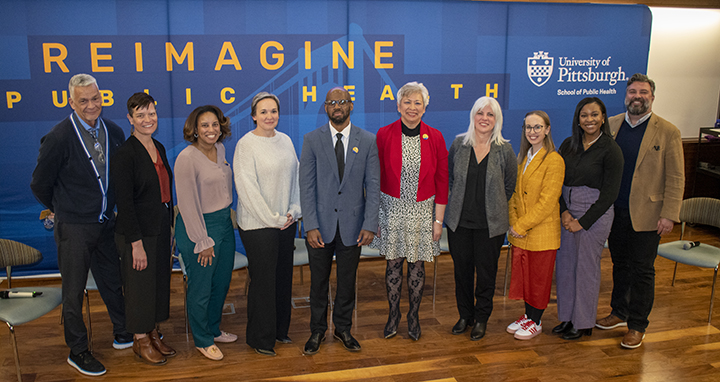Experts in community engagement share insights at Pitt Public Health symposium
When asked for words of wisdom gleaned from conducting community-engaged work, experts from academia and public health advocacy spoke of truth telling, finding joy, being present, remaining flexible and showing compassion.
The panel discussion, “Collaborate & Catalyze: Improving Public Health through Research-Practice Partnerships,” was held at the Public Health Building on March 19, the last in a series of events to mark the 75th anniversary of the School of Public Health.
“Equity must be viewed as the cornerstone to all of our work,” Carl Lawson, PhD, MPH, MA, Pitt Health Science’s associate vice chancellor for diversity, equity and inclusion, said during opening remarks. “All individuals should feel valued, respected and included in decision making about their health.”
Creating spaces to listen and heal was a theme echoed by others at the symposium, convened by Jessica Burke, PhD, MHS, vice dean and professor of behavioral and community health sciences, and Thistle I. Elias, DrPH, MPA, assistant professor of behavioral and community health sciences and director of community engagement at the school. The discussion was moderated by Pitt Public Health Dean Maureen Lichtveld, MD, MPH.

“It’s important to show up, but you need to show up in the right way,” Keith Caldwell, EdD, MSW, executive director of place-based initiatives at Pitt’s Office of Engagement & Community Affairs, said about Pitt’s work to build neighborhood relationships in and around the University. Co-presenting with Kelly Protho, director of Pitt’s Community Engagement Center in the Hill District, the duo emphasized the need to hire neighborhood residents to develop programs that not only serve their communities but also assist the University in reaching its teaching and research goals.
Sarah Krier, PhD, MPH, assistant professor of infectious diseases and microbiology, and Rob Pompa, community co-chair for the Pennsylvania HIV Planning Group, spoke of their partnership to track stigma in health care settings among people living with HIV. Pompa, a social worker who was diagnosed with HIV in 2001, recalled a nurse scolding him with “That’s what you get,” during an HIV-related blood test.
The need for compassion and active listening in community work is a global one. Working in close partnership with Projet Jeune Leader (PJL), a nonprofit organization that provides sexuality education to young adolescents across rural Madagascar, Burke and Sara Baumann, PhD, MPH, assistant professor of behavioral and community health sciences, use collaborative and community-based filmmaking to shift attitudes about sexuality education across the region.
Their work with PJL started as “cold call” email to the organization in 2020 and has evolved into a program of shared values as well as shared governance with PJL staff members Tahiry Anjarasoa and Mihaja Raonivololona.
Emphasizing the need to be creative and have fun, Burke also acknowledges that community-engaged work can be challenging and the journey a long one.
“Creating spaces where people can be refreshed and restored is needed,” said Dani Wilson, MSW, executive director of the Cancer & Environment Network of Southwest Pennsylvania. Wilson and Tina Ndoh, PhD, associate professor of environmental and occupation and health and associate dean for practice, are organizing an Environmental Justice Summit May 9-14 to connect scholars and practitioners, and to offer healing events for people working in the field.
“It’s really important that we operate from a place of love and healing,” said Wilson. “It’s about sharing understanding and slowing down to create spaces to heal.”
-Clare Collins